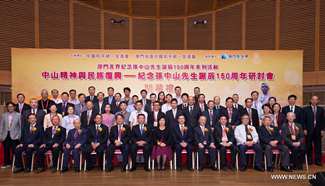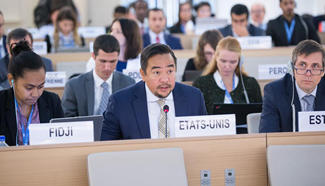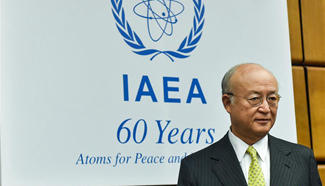
Fireworks light up the sky above the West Lake in Hangzhou, capital of east China's Zhejiang Province, Sept. 4, 2016. The 11th G20 summit was held in Hangzhou from Sept. 4 to 5. (Xinhua/Xu Yu)
BEIJING, Sept. 19 (Xinhua) -- The G20 summit concluded earlier this month in Hangzhou has left a positive legacy that will benefit the world's economy and stability.
The summit strengthened partnerships, with members agreeing to work together to reinvigorate the world economy and deal with global issues.
Documents adopted -- including a communique on development direction, targets and measures for cooperation, such as expanding opening up and implementing inclusive development -- demonstrate will for partnership and common development,.
To show the determination for common development, the summit put the development issue at the center of the global macro policy framework.
"To brave the rough waters of the world economy and start a new journey for future growth, it is good to know that we are in the same boat," Xi Jinping, President of China, said in his opening address on Sept. 4.
China invited developing countries and emerging markets, the most in the history of the G20 summit, to talk about the global economy and have their voices heard.
The summit helped improve global economic governance by pushing structural and financial reforms.
Leaders endorsed an agenda toward a more stable and resilient international financial architecture, and promised to continue to improve the analysis and monitoring of capital flow, and management of risk stemming from capital flow volatility.
They agreed to continue reform of international financial institutions' quotas and voting rights to make them better represent emerging markets and developing countries.
They also reiterated opposition to trade protectionism and formulated guiding principles for investment policy.
The summit offered routes to long-term and sustainable global growth -- innovation and inclusiveness -- against the backdrop of slow global economic recovery.
Leaders agreed to concentrate on mid- to long-term growth through innovation, a new paradigm based on knowledge and new, cleaner technology.
Consensus was reached on inclusive and interconnected development, so the G20 will benefit the whole world. For the first time, leaders agreed to support Africa and the least developed countries by providing more investment in infrastructure and boosting their technological level.
Leaders ratified an action plan for implementing the 2030 Agenda for Sustainable Development.
At the summit, all members also agreed to implement the Paris Agreement on climate change.
Actions speak louder than words and the Hangzhou summit agreements will only prove beneficial for the world if well implemented.
Related:
ROME, Sept. 17 (Xinhua) -- The G20 summit held in the eastern Chinese city of Hangzhou showed the strength and quality of China's leadership, and proved to be a possible new model in terms of global economic governance, according to Italian experts.Full Story
Spotlight: Overseas analysts hail China's role in G20
BEIJING, Sept. 9 (Xinhua) -- Overseas China-watchers have hailed the country's active and more mature role in the Group of 20 (G20) by hosting a summit that highlighted innovation and cooperation to spur global economic growth.Full Story
Interview: China endows G20 with long-term vision, say Argentine experts
BUENOS AIRES, Sept. 6 (Xinhua) -- As host of the recent Group of 20 (G20) Summit, China has helped redefine the group's mission, and in the process given it long-term vision, say Argentine experts.Full Story











